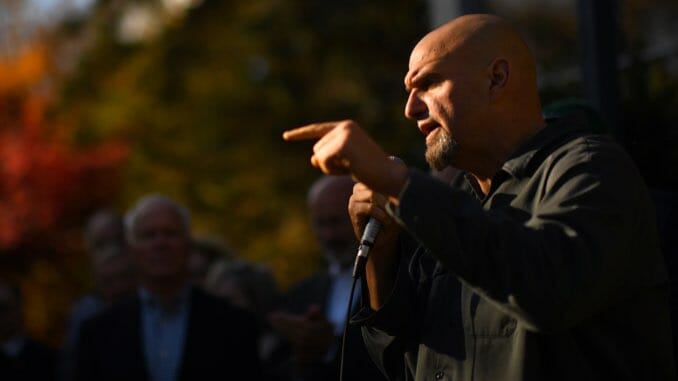The Most Competitive U.S. Senate Races in 2022
Photo by Mark Makela/Getty
In 2020, Democrats Rev. Raphael Warnock and Jon Osoff changed the balance of power in the U.S. Senate with their run-off election victories. But with a 50/50 split, Chuck Schumer’s position as Majority Leader sits on a knife’s edge, and most states will be going back to the polls in 2022—including, once again, Georgia. Warnock holds the seat vacated by former Sen. Johnny Isakson, whose term was set to expire next year. Additional seats currently held by 21 Republican and 12 Democratic Senators will up for grabs, and five of those Republican Senators are retiring. The Democrats would seem to have the advantage to hold onto the Senate, but midterms are traditionally difficult for the party in power—especially when led by an unpopular president—and Republicans will look to pick up seats in places like Georgia, New Hampshire and Nevada.
In our increasingly partisan landscape, most of the incumbents are safe. But we’ve been looking at and regularly updating the 10 most competitive Senate races in 2022, in order of how likely they’ll flip. This is our final update.
1. Nevada – Sen. Catherine Cortez Masto (Dem.)Nevada was more competitive than expected in 2020, and Republicans are taking it seriously this November, as Sen. Masto is up for reelection after the former Nevada Attorney General narrowly defeated Joe Heck by a margin of 2.6% in 2016 to succeed majority leader Harry Reid. Republicans have recruited another former state Attorney General, Adam Laxalt, to challenge for the seat. Polling shows Cortez Masto’s slightly up, but expect the margin in this one to be razor thin.
2. Wisconsin – Sen. Ron Johnson (Rep.)Ron Johnson was elected to the senate in 2010, defeating Sen. Russ Feingold in a Republican wave that year. A fiscal conservative, he was reelected in 2016 in a rematch with Feingold by a margin of 3.4%, capturing 50.2% of the vote. Wisconsin has since elected a Democratic governor in 2018 and tilted toward Biden two years ago. Johnson will be running for a third term, but has given his opponent plenty of fodder by grabbing hold of that most famous political third rail, social security. He’ll face Lt. Gov. Mandela Barnes, who defeated Milwaukee Bucks senior vice president Alex Lasry and State Treasurer Sarah Godlewski in a crowded primary. Barnes has strong backing from the national party and will be in a tight race to retake this seat from the Republicans, who have also poured money into painting Barnes as too far to the left for Wisconsin.
3. Pennsylvania – Sen. Pat Toomey (Rep.)*When Toomey was elected to represent Pennsylvania’s 15th District in the U.S. House in 1998, he pledged to serve no more than three terms. He was elected to the Senate in 2010 and won a second term by a margin of 1.5% as Donald Trump breached the blue wall in 2016. But Pennsylvania continues to be a competitive state, and Toomey announced that he won’t be seeking a third term as Senator. The open seat attracted plenty of candidates from both parties. On the Democratic side, Lt. Gov. John Fetterman beat out moderate U.S. Rep. Conor Lamb. He’ll go up against Mehmet Oz of The Dr. Oz Show in November. Recent polling has Fetterman with a growing lead, thanks to both Oz’s poor attempt to connect to Pennsylvania voters and Fetterman’s success at tagging him as an out-of-touch New Jerseyite.
4. Georgia – Rev. Raphael Warnock (Dem.)Gov. Brian Kemp appointed businesswoman Kelly Loefler to the Senate in December of 2019 to succeed Sen. Isakson, who resigned due to health concerns. Her challenger Rev. Raphael Warnock unseated her to give the Democrats a 50/50 split and control of the U.S. Senate. Democratic voters showed up in unprecedented numbers for a run-off and they’ll have to repeat that in a non-presidential election year to keep Georgia blue. He’ll be running against former University of Georgia football star Herschel Walker, a popular figure in the state, but one who comes with a lot of baggage. Allegations of domestic violence, secret children, stalking and physical threats have been piling up against Walker, who was diagnosed with dissociative identity disorder years ago, and Warnock has begun polling ahead of his Republican opponent. Gaffe after gaffe from Walker has given Democrats increasing confidence in holding a seat, which was once considered their most at-risk.
5. North Carolina – Sen. Richard Burr (Rep.)*North Carolina’s junior Senator Thom Tillis surprised pundits by holding onto his seat in purple North Carolina in 2020, but Richard Burr decided not to do the same, announcing his retirement soon after winning his fourth term in 2016. It’s just as well, in the wake of insider trading allegations that saw him sell off hundreds of thousands of dollars in stock after being briefed on the severity of Covid-19—even Fox’s Tucker Carlson was calling for his resignation. He’s remained in the Senate, but the seat is now up for grabs. Former state Supreme Court Chief Justice Cheri Beasley emerged from a crowded field to win her Democratic primary in May, while former U.S. Rep. Ted Budd beat former Gov. Pat McCrory for the Republican nomination. Budd seems to have a slight polling advantage going into the general election, but the race has become surprisingly tight.
-

-

-

-

-

-

-

-

-

-

-

-

-

-

-

-

-

-

-

-

-

-

-

-

-

-

-

-

-

-

-

-

-

-

-

-

-

-

-

-








































